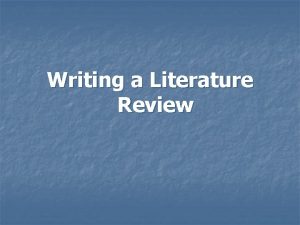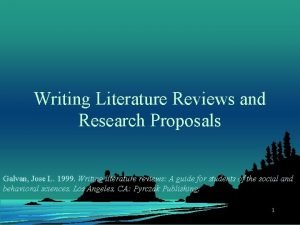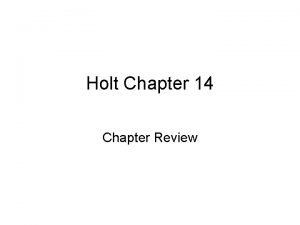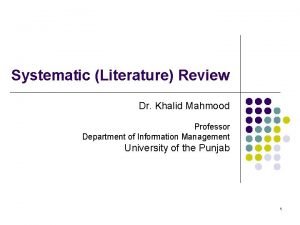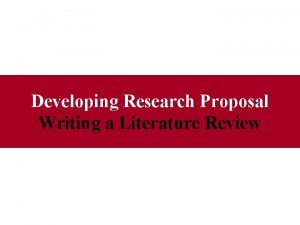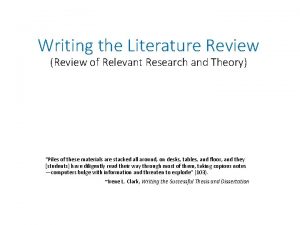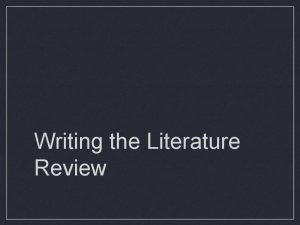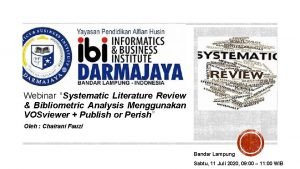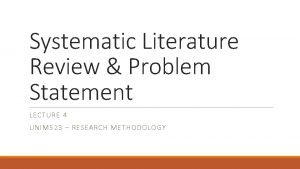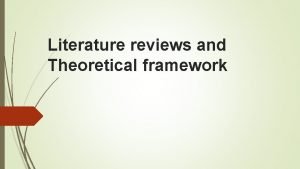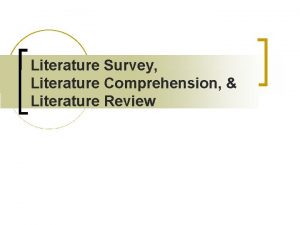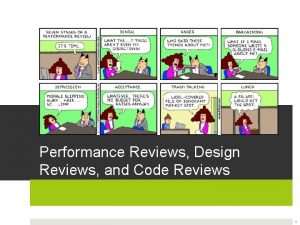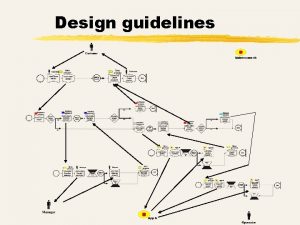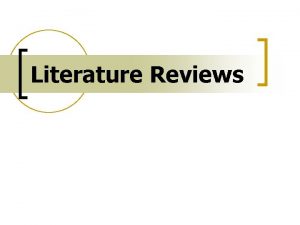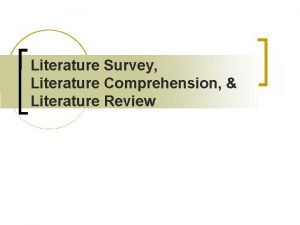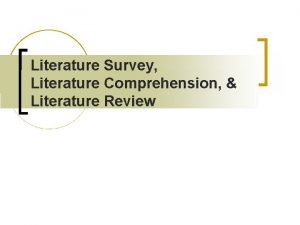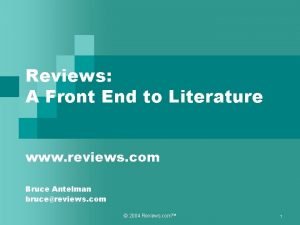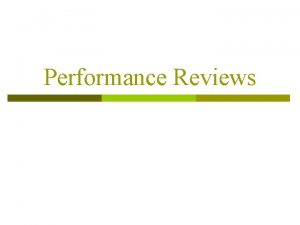Literature Review Guidelines Literature reviews are designed to














- Slides: 14

Literature Review Guidelines

Literature reviews are designed to do two things: 1) give your readers an overview of sources you have explored while researching a particular topic or idea and 2) demonstrate how your research fits into the larger field of study, in this case, literature.

• Literature reviews can be included into a research paper or manuscript. • You may quote or paraphrase from the sources, and all references to sources should include in-text parenthetical citations with a reference list at the end of the document.

General Guidelines to Consider when Developing a Literature Review 1. Choose a variety of articles that relate to your subject, even if they do not directly answer your research question. For example: If your research question focuses on how jealousy destroyed Othello’s life, you may be able to find some articles that address this specific question. You may also find literature regarding jealousy from a psychological or religious point of view as well as its causes.

General Guidelines to Consider when Developing a Literature Review 2. Choose the most relevant information from the articles as it relates to your subject and your purpose. Remember, the purpose of the literature review is to demonstrate how your research question fits into a larger field of study.

General Guidelines to Consider when Developing a Literature Review 3. Carefully examine the articles. Look at style, statistics, results, ideas, concepts, the author's purpose, etc. Include controversies when they appear in the articles. For example: You should look for the strengths and weaknesses of how the author conducted the study. You can also decide whether or not the study can be used for other topics or whether the findings relate only to the specific study. Ask yourself why the author conducted the study and what he/she hoped to gain from the study.

General Guidelines to Consider when Developing a Literature Review 4. Organize your information in the way that makes most sense. Some literature reviews may begin with a definition or general overview of the topic. Others may focus on another aspect of your topic. Look for themes in the literature or organize by types of study.

General Guidelines to Consider when Developing a Literature Review 5. Make sure the information relates to your research question/thesis. You may need to clearly show the literature relates to the research question; don't assume that the connection is obvious.

General Guidelines to Consider when Developing a Literature Review 6. Check to see that you have done more than simply summarize your sources. Your literature review should include a critical assessment of those sources.

General Guidelines to Consider when Developing a Literature Review • 7. Be sure to develop questions for further research. Again, you are not simply regurgitating information, but you are assessing and leading your reader to questions of your own, questions and ideas that haven't been explored yet or haven't been addressed in detail by the literature in the field.

Searching for the topic

Sample Literature Review Many critics have discusses theme of jealousy in Shakespeare’s play Othello. They have looked at the way his behavior has destroyed his way of life. One critic, Megan Brunn, discusses this in her article “Jealousy Exploited in Othello” where she describes … Some scholars believe that Iago should take full blame for the disaster that happens to Othello and his wife. One website, Shakespeare Navigators, shows that, “Iago's warnings against jealousy have the effect that he was probably looking for: Othello denies that he is jealous. From Iago's point of view, this is a good sign. ” … The above information shows the opinions of different writers and scholars regarding Othello and his jealousy. However, very little information has been found that explains the possible reasons for Iago’s behavior and why he created such a huge problem that led to so many deaths.

After the Literature Review • The literature review will be followed by the outline – showing how you intend to divide and organize your chapters. • The last page(s) of the proposal will be the Works Cited list, where you list the sources used for your research. This will be discussed in more detail when we reach chapters 5 & 6.

Sources • http: //owl. english. purdue. edu/owl/resource/ 666/01/
 Insidan region jh
Insidan region jh Review title examples
Review title examples Writing literature reviews galvan
Writing literature reviews galvan Chapter review motion part a vocabulary review answer key
Chapter review motion part a vocabulary review answer key Ap gov final review
Ap gov final review Narrative review vs systematic review
Narrative review vs systematic review Prisma diagram example
Prisma diagram example Narrative review vs systematic review
Narrative review vs systematic review Literature review theory
Literature review theory 8 importance of literature review
8 importance of literature review Systematic literature review and bibliometric analysis
Systematic literature review and bibliometric analysis Example of statement of the problem
Example of statement of the problem Literature review gantt chart
Literature review gantt chart Literature review format
Literature review format Literature review vs theoretical framework
Literature review vs theoretical framework

